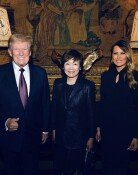Japan Steps Up Moves to Steal Korean Islets
Japan Steps Up Moves to Steal Korean Islets
Posted December. 26, 2009 15:19,
A Japanese history and geography education handbook released Friday urges high schools to deepen their understanding of territorial issues based on what is taught at middle schools. In July last year, a revised educational handbook for social studies in Japan said the country is locked in a territorial row with neighboring Korea over the Dokdo islets in the East Sea, stressing the need to deepening student understanding of Japans territoriality.
The handbook technically inherits the content of a middle school teaching manual that claims the islets as Japanese territory, a provocation aimed at stealing them from Korea. Japan`s Education Minister Tatsuo Kawabata said the handbook did not specifically mention Dokdo but simply described the islets.
Japan unilaterally included Dokdo into Shimane Prefecture in the process of its annexation of the Korean Peninsula in the early 20th century. This act, however, does not change the fact that the islets are Korean territory both historically and technically, something which is evidenced by many Japanese historical documents in addition to Korean ones. An 1896 document made by the Japanese Foreign Ministry and government body called Daijokan shows that Tokyo acknowledged the islets were outside of Japanese territory. A notice issued by Japans finance ministry a year after the countrys World War II defeat classified Dokdo as foreign land.
Most residents in the prefecture had no idea about Dokdos location before Japan acted to steal the islets. The Japanese governments attempt to make Dokdo its territory shows that Tokyos sense of aggression and domination from the imperial era remains in its blood.
After his inauguration in September, Japanese Prime Minister Yukio Hatoyama urged courage to face history squarely and forward-looking relations with Korea. Facing history squarely starts from reflecting on its history of aggression and considering the pain suffered by its victims. Teaching Japans future generations on claims that justify the countrys aggression of other countries is merely distortion and deception of history.
Many people expect the Hatoyama government to show a perception of history different from that of the Liberal Democratic Party next year, which will mark the centennial anniversary of Japans annexation of Korea. Tokyo, however, has showed its limit by continuing to claim Dokdo as its territory. It says it did not specify Dokdo in the education manual in consideration of Seoul. Korea should respond sternly with the issue to get Japan to drop its territorial claim over the islets.
Headline News
- Joint investigation headquarters asks Yoon to appear at the investigation office
- KDIC colonel: Cable ties and hoods to control NEC staff were prepared
- Results of real estate development diverged by accessibility to Gangnam
- New budget proposal reflecting Trump’s demand rejected
- Son Heung-min scores winning corner kick







